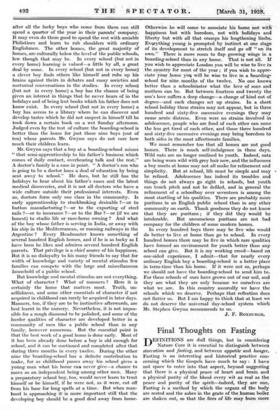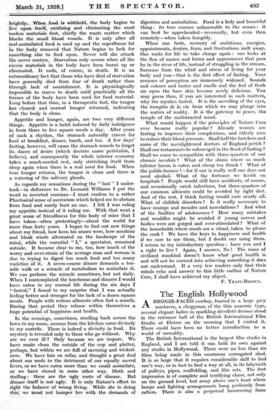Final Thoughts on Fasting
DEFINITIONS are dull things, but in considering Nature Cure it is essential to distinguish between starvation and fasting, and between appetite and hunger, Fasting is an interesting and historical practice con- cerning which the Gospels have much to say : I have not space to enter into that aspect, beyond suggesting that there is a -physical peace of heart and brain and a physical purity of the blood every wit as real as the peace and purity of the spirit—indeed, they are one. Fasting is a method by which the organs of the body are rested and the ashes in the grate of the human boiler are shaken out, so that the fires of life may burn more • brightly._ When_ food is withheld, the body begins to live upon, itself, oxidizing and eliminating the most useless materials first, chiefly the waste matter which blocks the small blood- vessels. It is only after all -mal-assimilated food is used up and the superfluous fat in the body removed that Nature begins to look for something else to feed upon. Never will she attack the nerve centres. Starvation only occurs when all the • excess materials in the body have been burnt up or eliminated. It ends, of course, in dath. It is an extraordinary fact that those who have died of starvation have generally died from fear of death rather than through lack of nourishment. It is physiologically impossible to starve to death• until practically all the tissues of the body have been used for food material. Long before that time, in a therapeutic fast, the tongue has cleared and normal hunger returned, indicating that the body is clean.
Appetite and hunger, again, are two very different things. Appetite is a habit induced by daily indulgence in from three to five square meals a day. After years of such a rhythm, the stomach naturally craves for food at breakfast, dinner, lunch, and tea. A few days' fasting, however, will cause the stomach muscle to forget its dance of desire (which doctors name peristalsis, I believe), and consequently the whole interior economy takes a much-needed rest, only stretching itself from sleep again when there is a real need for food. When true hunger returns, the tongue is clean and there is a watering of the salivary glands.
As regards my sensations during the " fast " I under- took—in deference to Dr. Leonard Williams I put the word in inverted commas—I must confess to a rather Pharisaical sense of asceticism which helped me to abstain from food and surely hurt no one. I felt I was ruling my appetite instead of it ruling me. With that went a great sense of friendliness for this body of mine that I have taken—often protestingly—about the world for More than forty years. I began to find out new things about my friend, how keen his senses were, how sunshine and bleak winds alternated on the landscape of the mind, while the essential "I," a spectator, remained outside. It became clear to me, too, how much of the worry and over-strain of the average man and woman is due to trying to digest too much food and too many varieties of it. A seven-course dinner demands a ten- mile walk or a miracle of metabolism to assimilate it. We can perform the miracle sometimes, but not daily. When I contemplated the luncheons and dinners I would have eaten in my normal life during the six days I f` fasted," I found to my surprise that I was actually feeling better and stronger for the lack of a dozen square meals. People with serious ailments often fast a month. During that period they release within themselves a huge potential of happiness and health.
In the evenings, sometimes, strolling back across the lawn to my room, aromas from the kitchen came divinely to my nostrils. There is indeed a divinity in food. Its mystery is revealed only to those who go without. Why are we ever ill ? Only because we are impure. We have made clean the outside of the -cup and platter, perhaps, but within we are full of ravening and wicked- ness. We have lain on sofas, and thought a great deal about our souls to the detriment of our equally sacred livers, or we have eaten more than we could assimilate, or we have sinned in some other way. Sloth and stuffing : these are the ugly roots of disease. But disease itself is not ugly. It is only Nature's effort to right the balance of wrong living. While she is doing this we must not hamper her with the demands of digestion and assimilation. Food is a holy and beautiful thing : its true essence unknowable to the senses : it can best be apprehended—reverently, but even then remotelywhen taken hungrily.
When one fasts, memory of ambitions, energies, appointments, desires, fears, and frustrations melt away. One waits for life to take charge again : one looks at the flux of names and forms and appearances that pass by in the river of life, instead of struggling in the stream. Surcease from the whirl and stress of living for your body and you—that is the first effect of fasting. Your avenues of perception are immensely widened. Sounds and colours and tastes and smells and the feel of fresh air upon the bare skin become newly delicious. You may guess then, if you are interested in such matters, why the mystics fasted. It is the unveiling of the eyes, the iremplin de la vie from which we may plunge into the waters of reality. It is the gateway to peace, the temple of the undistracted mind.
What would happen if the principles of Nature Cure ever became really popular ? Already women are fasting to improve their complexions, and elderly men to reduce their blood pressure. Shall half the butchers and some of the unenlightened doctors of England perish ? Shall our restaurants be submerged in the flood of fasting ? Shall we cease to sympathize with three-quarters of our chronic invalids ? What of the slums where so much inferior bacon is eaten and cheap tea drunk ? What of the public-houses ?—for if one is really well one does not need alcohol. What of the fortunes we lavish on hospitals ? People would still have accidents, of course, and occasionally catch infections, but three-quarters of our common ailments could be avoided by right diet. And of the rest, I think fasting would cure nearly all. What of childish disorders ? Is it really necessary to have mumps and measles and inoculations ? And what of the frailties of adolescence ? How many mistakes and muddles might be avoided if young nerves and bodies were not gorged and over-stimulated ? What of the households where meals are a ritual, taken to please the cook ? We have the keys to happiness and health if we care to use them, but I doubt our using them. I return to my introductory question : have you and I a right to live ? Again, I answer, No ! The mass of civilized mankind doesn't know what good health is and will not be coerced into achieving something it does not understand. If a very few readers only find their minds echo and answer to this little outline of Nature Cure, I shall have achieved my object.
F. YEATS-BROWN.



































 Previous page
Previous page